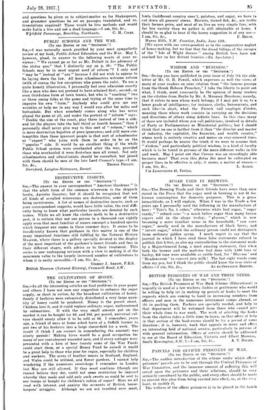WISDOM AND "BUSINESS."
(To THE EDITOR Or THE "SPECTATOR:1
Ste„—Seeing you have published in your issue of July 7th the able letter of Mr. G. H. Powell, which expresses so well the views of many of your readers on your citation from "the famous passage from the Greek Hebrew Preacher," I take the liberty to point out what, I think, must itecesmrily be the opinion of many readers on (ho citation from Burke by Mr. A. Mounsey Heysham; namely. that it refers to men whose work belongs, if I may put it so, to a lower grade of intelligence; for instance, clerks, bureaucrats, and such like—in short, what the French call employes Wordre, meaning those whose work consists in carrying on the decisions and directions of others along definite lines. In this class many of those are included whom you call politicians, involved in details of Party or Parliamentary or Ministerial politics; but I should think that no one is farther from it than "the director and master of industry, the capitalist, the financier, and wealth creator," whose work is entirely creative and moves on ever-renewed lines. It would perhaps be nearer the truth if we were to assume that "wisdom." and particularly political wisdom, is a kiud of faculty which is to be found in persons of the more different walks in life and work. May I point out that Cavour was an exceedingly able business man? That even this flatus Del must be cultivated on proper lines to be effective is only, it seems, a matter of course.—


































 Previous page
Previous page